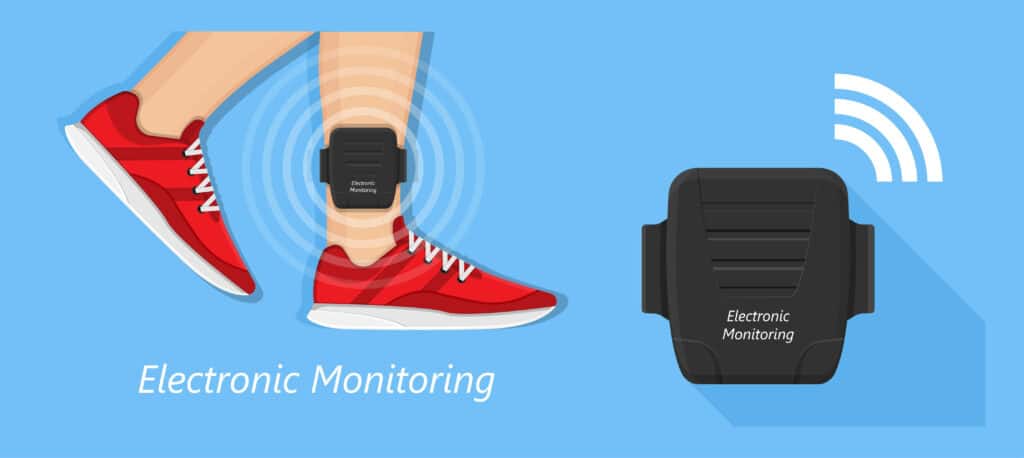Inmates in federal prison can also secure an early release from prison through CARES Act home confinement. The Act’s name is the Coronavirus Aid, Relief, and Economic Security Act. It was signed into law in March 2020.
Essentially, the CARES Act allows select eligible inmates to be placed in home confinement during the federal COVID-19 state of emergency. Traditionally, the Federal Bureau of Prisons allowed inmates to be placed in home confinement for the last 10 percent or six months of their sentence. Per the CARES Act, the BOP can consider additional time in home confinement than previously stipulated.
Table of contents
- CARES Act Home Confinement Overview
- Decision-Making Authority
- Criteria an Inmate Needs to Meet for Home Confinement under CARES Act
- The Process of Applying for CARES Act Home Confinement
- What Happens After Release?
- What Can You Expect During Home Confinement Under the CARES Act?
- Will Inmates Under Home Confinement Go Back to Prison After Covid?
- Your CARES Act Home Confinement Team

CARES Act Home Confinement Overview
Under the CARES Act and four clarifying memos from the Federal Bureau of Prisons and Attorney General, eligible inmates can request placement in home confinement during the pandemic. This is a time served at home, which counts toward their sentence.
The CARES Act home confinement program has shifted several times over the past two years. These shifts revolved around four qualifying memorandums:
- March 26, 2020: First Attorney General’s Memorandum
- April 3, 2020: Second Attorney General Memorandum
- November 16, 2020: First Bureau of Prisons Memorandum
- April 13, 2021: Second Bureau of Prisons Memorandum
Initially, this program permitted eligible, at-risk inmates to serve time in home confinement to protect them from COVID-19. The Attorney General’s Office and Bureau of Prisons (BOP) have tweaked this emergency authority vehicle for early release several times over the past year, changing the eligibility criteria.
Determining Placement Duration
The tricky issue here is that it is unclear how long this home confinement placement will last. In a perfect world, you could remain at home for the duration of your imprisonment. In the worst-case scenario, you could go home for the period of the federal pandemic plus 30 days. This is an unsettled issue of federal law actively being hotly debated by stakeholders.
More recently, the Biden Administration rescinded a former Trump Administration policy regarding which CARES Act home confinement inmates may remain at home after the federal COVID-19 state of emergency has concluded. The Federal Bureau of Prisons is currently developing new guidelines for who can stay at home and who must return to custody.
While we at the Zoukis Consulting Group are following this issue closely, the current best practice is to submit a clemency petition to resolve any time disparity. This is the current direction from the Biden Administration. With this being said, as soon as the Bureau promulgates new guidelines, we will use these guidelines to argue for continued CARES Act home confinement placement for clients.
Decision-Making Authority
One downside of CARES Act home confinement is that the Bureau of Prisons retains exclusive control over CARES Act home confinement approval. The inmate’s warden has complete control and authority over granting or denying CARES Act home confinement requests with limited exceptions.
To date, the Zoukis Consulting Group has never had a client denied CARES Act home confinement. While this can be viewed as a glowing recommendation of our process, we are also cautious not to move forward on CARES Act home confinement requests until we prequalify clients.
While some prison consulting firms agree to submit these requests for any Federal Bureau of Prisons inmate, we believe it essential not to accept retainer funds from anyone unless we believe we will succeed at the project. In our minds, this is a matter of honesty, ethics, and professional responsibility.
It can be challenging to know what to put forward during the review, but this is where the Zoukis Consulting Group comes in. We can help you or your incarcerated loved one make the petition for a review on legal grounds applicable to the CARES Act. It can be a lengthy process, but you can weather the storm with us by your side.
Criteria an Inmate Needs to Meet for Home Confinement under CARES Act
The Bureau has shifted CARES Act home confinement eligibility guidelines over the past two years. While this makes CARES Act home confinement something of a moving target, we present the most recent guidelines below.
The current guidance from the Bureau of Prisons is that Bureau officials are to consider these factors when determining CARES Act home confinement eligibility:
- Offense not violent, sexual, or terrorism-related.
- No detainers.
- Inmates housed at a minimum- or low-security prison.
- Minimum- or low-risk PATTERN score.
- Verifiable release plan
- No 100- or 200-series incident reports within the past 12 months.
- No violent- or gang-related infractions while in custody.
- Serving 50 percent or more of the sentence, or if the inmate has 18 months or less remaining on their sentence, having served over 25 percent of their sentence.
- While not required, Bureau staff review COVID-19 risk factors per CDC guidelines.
The above-listed eligibility criteria are the preferred guidelines for CARES Act home confinement. With this being said, if found ineligible, inmates can seek review from a special federal prison task force. This Central Office task force reviews non-guidelines inmates for potential CARES Act home confinement.
While we do not recommend non-guidelines inmates seek CARES Act home confinement (there are better options), our team can aid you in submitting non-guidelines requests if you prefer.

The Process of Applying for CARES Act Home Confinement
Briefly, the Federal Bureau of Prisons claims there’s no need to apply for CARES Act home confinement. They allege they are constantly reviewing inmates for suitability for home confinement.
To state this plainly, every single client we have secured CARES Act home confinement for was eligible, but Bureau staff failed to initiate the review process. We have assisted several dozen clients in securing CARES Act home confinement. While the Bureau may, theoretically, have eventually reviewed their cases, we view this with a healthy degree of skepticism.
Since we can’t comment on the likely non-existent automatic CARES Act home confinement review process, below we present our approach for retained clients.
Our CARES Act Home Confinement Process
Our team starts by reviewing various client documents. This typically includes the presentence report, the latest annual Unit Team review, custody and classification form, and other case documents. These help us fully understand your unique circumstances and ensure you qualify.
At this point, our team drafts a request for clients to submit to their case managers. Unlike a case manager-originated request, the petitions we develop present clients in the best possible light. This requires fleshing out background information, not merely the client’s criminal history and eligibility.
After submission, the case manager forwards the request to the client’s warden. If the warden supports the petition, U.S. Probation inspects the client’s home to ensure it is suitable. The request is then sent to the applicable Residential Reentry Manager (RRM) to schedule the release. Clients are transferred to home confinement following a two-week quarantine period.
What Happens After Release?
Before release to home confinement, inmates must go through a 14-day quarantine period at their facility. Sometimes, the quarantine process begins earlier, even before an individual is approved for home confinement. Recent history shows the BOP doing this to speed up the release process.
Once released, an approved visitor may provide transportation. The inmate may also choose to take public transportation, but we don’t recommend this because of the ongoing COVID-19 pandemic.

What Can You Expect During Home Confinement Under the CARES Act?
After release into home detention, an inmate must maintain clear communication with Bureau officials. Failure to do so can revoke home confinement and placement back into federal prison.
Below are a few aspects the BOP may require when finishing your sentence in home confinement. Note that these requirements differ by supervising facility and individual staff members. With this being said, all CARES Act home confinement inmates are subjected to various monitoring devices.
Electronic Monitoring
Inmates on CARES Act home confinement are typically monitored electronically. This can include one of two monitoring approaches:
- An electronic monitor affixed to the inmate’s ankle.
- A landline phone where the inmate must answer whenever Bureau staff call.
Both of these approaches allow the BOP to know your locations at all times.
Ankle Monitors
Electronic monitoring is primarily achieved through a tamper-resistant transmitter on the wrist or ankles. Inmates must wear the transmitter 24 hours a day to allow constant monitoring.
Transmitters are usually connected to a home phone line. When the transmitter releases radio signals, they are detected by the home phone, indicating to the monitoring center that an inmate is at home.
Most facilities contract a monitoring center to provide them with 24-hour daily monitoring. The monitoring center constantly monitors an inmate and reports promptly if the inmate is not in the authorized location.
Some common events that a monitoring center reports to the BOP include:
- Tampering with the monitoring equipment.
- Being absent without authorization.
- Failure to report for scheduled called-ins with probation officers or halfway house staff.
- Leaving home too early and returning too late (i.e., disregarding curfews).
Landline Telephones
The landline telephone approach is somewhat different. In this circumstance, Bureau staff will call the landline phone daily to ensure the inmate is home. These calls only occur during at-home times.
If monitored via a landline phone, ensure to turn up the volume and place the phone in a central location. Failure to answer the unannounced calls will result in adverse action.
While staff sometimes listen to reason the first time a call is not answered, they will likely revoke the home confinement placement if this continues to occur.
Regular and Unannounced Visits by Bureau Staff or Contractors
Bureau staff can and do conduct unannounced residence inspections. This ensures home confinement rules and policies are followed. Ensure to warn other house residents of this likely law enforcement interaction.
When Bureau staff conduct these unannounced inspections, they seek to ensure that the inmate is home, prohibited items are not present (e.g., alcohol, drugs, weapons, etc.), and felons are not in the residence.
Drugs and Alcohol Are Prohibited
Individuals on CARES Act home confinement remain federal inmates. As such, the Inmate Discipline Program still applies to them. The best way to think about this is that home confinement is the designated institution, not that these inmates are legally released from custody.
With the above in mind, inmates in home confinement should avoid any contact or use of drugs or alcohol. While other household members may be legally able to drink alcohol or use certain drugs (e.g., marijuana, depending on the jurisdiction), having these in the house is a recipe for disaster.
Play it safe and ask other house residents not to have these items present or have them in their own, separate areas.
Will Inmates Under Home Confinement Go Back to Prison After Covid?
It’s still unclear whether CARES Act home confinement inmates will return to prison after the pandemic is over.
However, the Office of Legal Counsel is advocating for the BOP to have the discretion to permit prisoners affected to finish their sentences in home confinement. This reversal is to avoid the issue of inmates in home confinement being returned en masse to correctional facilities.
According to United States Attorney General Merrick Garland, most prisoners in extended home confinement have experienced a life turnaround. They have reconnected with their families, found gainful employment, and followed home confinement rules. According to the U.S. Justice Department, this cohort of inmates has done exceptionally well confined at home during this emergency period.
Following the new legal opinion issued by the Office of Legal Counsel, it looks like there’s some hope for inmates in home confinement. To increase your chances of remaining in home confinement, follow all rules to the letter. Likewise, ensure your living conditions are stable.
Your CARES Act Home Confinement Team
Contact the Zoukis Consulting Group if you are interested in seeking CARES Act home confinement. Our team of expert federal prison consultants has assisted dozens of clients in securing releases to home confinement.
Our team can review your case to determine your eligibility, draft the request to be filed with the Bureau of Prisons, and troubleshoot any problems. Having an experienced team on your side can make all the difference in the world.
Book a one-hour initial consultation to speak with a member of our team today.
Published Mar 7, 2022 by Christopher Zoukis, JD, MBA | Last Updated by Christopher Zoukis, JD, MBA on Jul 20, 2023 at 1:55 am


